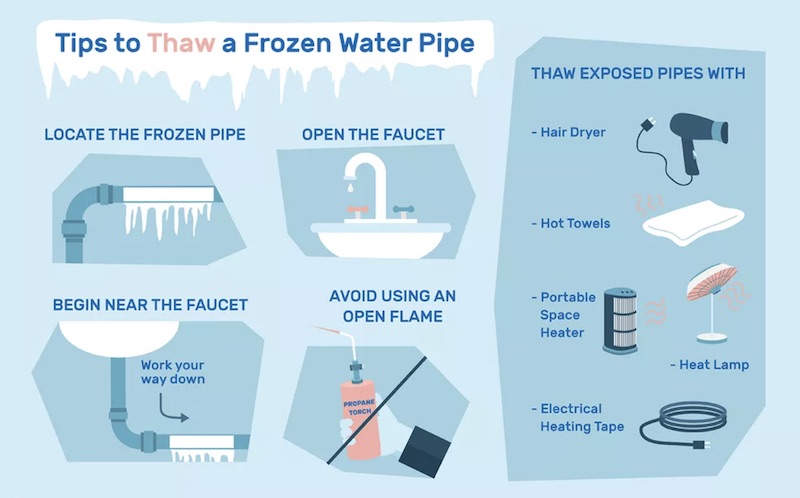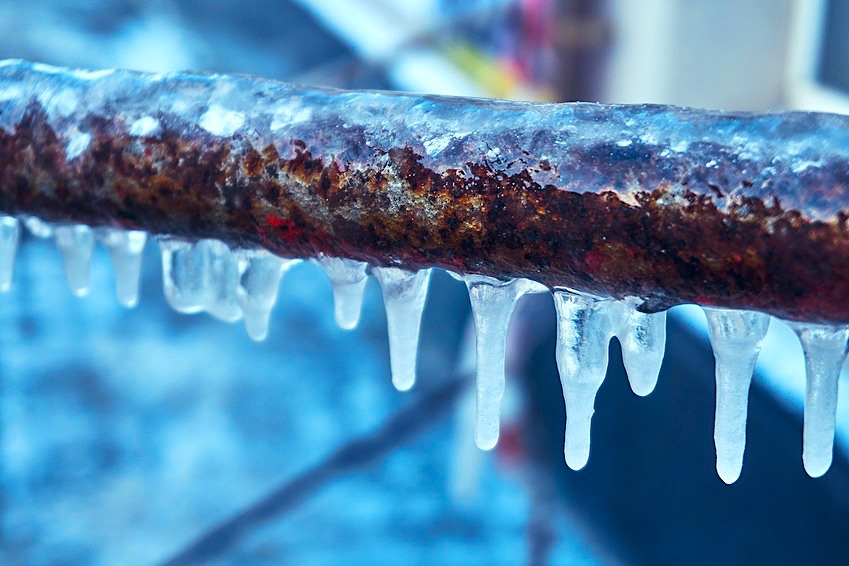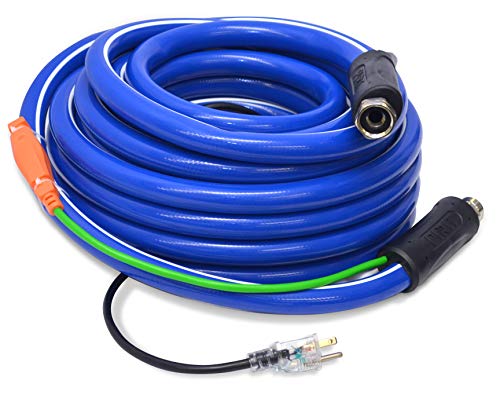Thanks for your support! If you make a purchase using our links in this article, we may make a commission. And, as an Amazon Associate, I earn from qualifying purchases. See the full disclosure here.
After you make the decision to purchase an RV, there is a lot of equipment that you’ll need to familiarize yourself with. One of those pieces of equipment is the RV water hose. An RV water hose is a hose that runs from a campground water spigot to your RV. It looks like your typical garden hose, so you should be able to identify it easily. The RV water hose connects from the campground spigot to the RV city water connection on the RV. This is the location where you screw in the hose.
Once you’re familiar with the RV water hose, one of the first things you need to do is learn how to keep it from freezing. When you’re traveling in your RV, there’s a good chance the nights will get very cold. This obviously isn’t true at all times of the year, but if you plan on traveling during the fall and winter, this is something you need to consider. If you fail to keep the RV water hose from freezing, you’ll run into some serious issues.
So, how do you keep an RV water hose from freezing? To keep you’re your RV water hose from freezing, you should insulate your hose. You can do this by wrapping it in a heat tape. Make sure the entire hose is covered so that it remains insulated. You can also keep it from freezing by keeping your faucet running. It’s harder for moving water to freeze, so keeping your faucet running means that a colder temperature will be required to freeze your hose.
What Temperature Will RV Water Lines Freeze?
Your RV water lines can start to freeze once it gets to 32 degrees Fahrenheit or 0 degrees Celsius. That’s the freezing temperature, so it’s possible for water to freeze at that point. However, water isn’t going to instantly freeze the second it reaches the freezing temperature. If the temperature is hovering around the freezing temperature, it will take a while for the water to reach the point where it’s fully frozen. As a result, if you’re using water fairly regularly and keeping your water moving, there isn’t a high risk of the water freezing at the freezing temperature.
The colder it gets the more you need to worry about your RV water hose freezing. That’s because the colder it gets, the less time it’s going to take for water to freeze. So, if it’s 0 degrees Fahrenheit, it isn’t going to take long for your RV water hose to freeze.
How to Unfreeze an RV Water Hose?

Sometimes there isn’t anything you can do and it’s simply too cold to keep your hose from freezing. In this situation, you still need water, so you need to unfreeze your RV water hose.
To unfreeze your RV water hose, the first thing you should do is use a heat gun on the hose connections. You should heat the connections points for 5 to 10 minutes. Make sure you move the gun to all sides of the connection so that it thaws on all sides.
Once you’ve thawed the connection point, you can unscrew the hose from the ports on your RV and water supply. Once it’s unscrewed, bring the hose inside for it to warm up. You can turn up the heat in your RV to speed up the process, but if you’re patient that isn’t necessary. It’s a good idea to drape the hose in your shower so that as it unfreezes the excess water doesn’t create a mess.
Once it’s unfrozen, check the hose for damage before reattaching it. Freezing can cause damage because water expands when it’s frozen. As a result, there is a chance that your hose could have burst, popped, or stretched in certain areas. If there isn’t any damage, you can reattach it. However, if there is damage, you’ll need to purchase a new hose.
Will RV Skirting Prevent My RV Water Hose From Freezing?
RV skirting will help keep the waterlines under your RV from freezing. It won’t do anything to keep the water hose from the spigot to the RV from freezing so be sure to scroll down to find the best heated water hoses.
But AirSkirts has many benefits such as:
- Superior Insulation from Cold and Heat
- No Modification or Installation Needed on Your RV
- You Can Set it Up in Under 30 Minutes
- AirSkirts Stays in Place in Snow, Wind, and Rain
- More Affordable than traditional Snap-on RV Skirts
- Military-Grade Construction Makes it Incredibly Durable
AirSkirts will protect the underside of your RV from freezing pipes, heat or cold loss, and damage from the elements. AirSkirts uses air as an insulator, resulting in an increase in heat or cold retention up to 75% greater than traditional skirts. And, AirSkirts works all year round saving you money in warm weather as well!
How Do I Heat My RV Water Hose?
One of the best ways to heat your RV water hose is with a heat cable. To do this properly you’ll need to measure the length of your hose so that you know how much cable you’ll need. You should then tape the heating cable to the hose with electrical tape every foot along the hose. Heat cable detects the temperature of the hose and will heat it up if it gets cold. As a result, you want several points where the cable is making direct contact with the hose.
Once you’ve applied the heat cable, you should cover the hose and heat cable with foam insulation tubes. These tubes will help keep the hose warm and insulated. You should then wrap the foam with pipe insulation tape.
You can then plug the heat cable into a power supply to turn it on. The heat cable will then start heating your hose. Finally, connect the hose to the water supply and your RV’s pump. It will then work as it normally would in warm weather.
Are There Heated Freshwater Hoses I Can Buy?
There are heated hoses that are designed specifically for freshwater. These hoses are generally more durable because they experience more exposure to the elements. If you choose to use one of these hoses, you need to be careful because you won’t be drinking water that is as safe as water you get from a well. You also need to check more frequently to ensure that your hose doesn’t freeze. Since these hoses are exposed to elements more, there is a higher chance that they freeze.
Best Heated Water Hoses for an RV
Here are three of the best heated RV water hoses currently on the market. Any of these three options should work for you.
1. Camco 24ft Cold Weather Heated Drinking Water Hose
This heated RV water hose from Camco is a self-regulating heated hose that protects from freezing down to -40 degrees Fahrenheit and Celsius. It is made with NSF-61 and is a certified drinking water hose. It has a female-to-male adapter which gives you the ability to connect to the water supply on either end of the house. This is dependant on the location of your electrical outlet.
Furthermore, the hose has a durable exterior jacket that protects the hose and electrical components from damage that could come from bad weather. It also has an 18AWG power cord with an LEG indicator plug. It operates on 120 VAC.
2. Pirit 50FT Heated Hose
This heated water hose from Pirit has been tested down to -42 degrees Fahrenheit. It is extremely durable thanks to its psi of 200. This is the pressure the hose can withstand. With a high psi, it is less likely to burst when the water expands as it freezes.
The hose comes with a 10-foot power cord with a lighted plug. It requires an electrical power source to run. Finally, if you aren’t satisfied with the product or if it breaks, the manufacturer is offering an 18-month warranty on the product.
3. Valterra Heated Fresh Water Hose
Finally, this heated water hose from Valterra provides smooth flowing drinking water in sub-zero temperatures. The hose is a self-regulating heat source that applies heat as the temperature drops. As a result, you won’t need to worry about your hose freezing except for in extreme circumstances.
The hose operates at 120 VAC and provides safe drinking water. It also has zippered insulation cuffs at both ends of the hose for added freeze protection.
Enjoy Your Next Trip with an Unfrozen RV Water Hose
The last thing you want to deal with on your vacation is a frozen RV water hose. It will be a hassle to fix and will ruin your entire day. Not only that, but it takes time away from fun things you could be doing instead. As a result, it’s important to make sure that your RV water hose remains unfrozen.
After reading, we hope you have a good idea of what to do should your RV water hose freeze. However, we also hope you have all the information you need to avoid an incident. We know there’s a lot of information to absorb, but it will all help you prevent your hose from freezing.
You should also consider getting a heated RV water hose. A heated RV water hose might be a little more expensive than a regular hose, but it isn’t a crazy price. It will also give you peace of mind and save you a lot of hassle. So, go ahead and get a heated RV water hose and enjoy your next trip without worry!
Do you understand how to thaw a frozen RV water hose? Are you going to purchase a heated RV water hose? Was the article helpful to you? Let us know in the comments!






We have the heated RV water hose from Camco and it does not hold up to the stated temps of down to -40 degrees Fahrenheit. It has even frozen up in the positive teens in Colorado. Just be aware that if this is your only water source coming in, om some really cold days/nights, you may have to go without water.
NO FREEZEWATER HOSE. EXPENSIVE, BUT WELL WORTH . BUILD QUALITY IS UNMATCHED AS WELL AS EFFECTIVE TO MINUS 40
I have a Camco hose but I’m concerned about the attached water filter. Are there any commercial products to prevent it from freezing?
Can I get a 100 footheated hose and how much does it cost